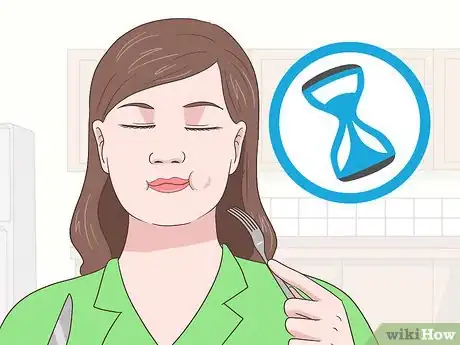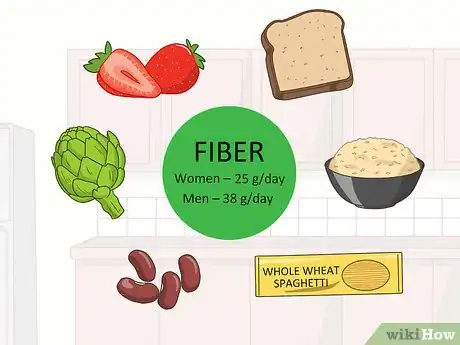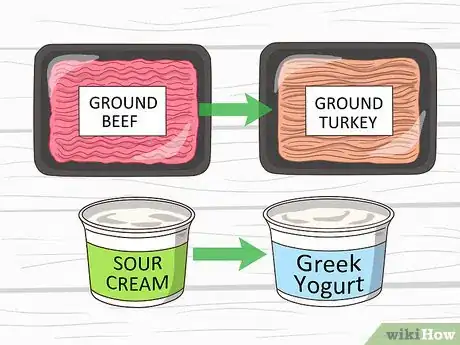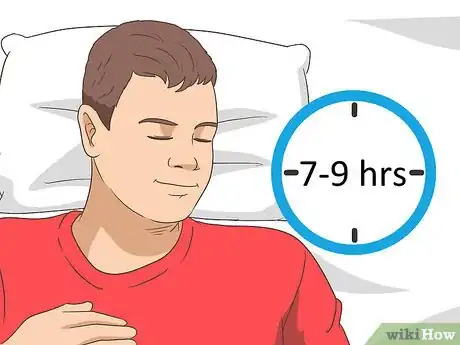This article was co-authored by Tara Coleman. Tara Coleman is a Clinical Nutritionist who has a private practice in San Diego, California. With over 15 years of experience, Tara specializes in sports nutrition, body confidence, and immune system health and offers personalized nutrition, corporate wellness, and online learning courses. She received a BS in Biology from James Madison University and spent six years in the pharmaceutical industry as an analytical chemist before founding her practice. Tara has been featured on NBC, CBS, Fox, ESPN, and Dr. Oz The Good Life as well as in Forbes, Cosmopolitan, Self, and Runner’s World.
There are 24 references cited in this article, which can be found at the bottom of the page.
wikiHow marks an article as reader-approved once it receives enough positive feedback. This article received 31 testimonials and 86% of readers who voted found it helpful, earning it our reader-approved status.
This article has been viewed 408,553 times.
Happiness and health are more closely related than you might think! A healthy lifestyle can boost your mood and increase life satisfaction while a positive mindset can lengthen your lifespan and help you avoid unhealthy habits. Start by reframing your mindset into an optimistic and active perspective. Your diet, habits, and social network can also affect both your mental and physical health.
Steps
Creating the Right Mindset
-
1Focus on the positive. Positive thinking is a big step towards creating a happier mindset. Instead of focusing on the negative, change your thoughts towards optimistic thinking.[1]
- Try to avoid self-criticism. Whenever you start thinking negatively of yourself, reframe it as a positive comment. For example, if you’re thinking, "I can't believe I'm so dumb," say instead, "I'm am smart! If I put my mind to it, I can learn anything!"
- If you make a mistake, think of it as a learning opportunity. For example, instead of thinking, “I’m so upset that I didn’t get that job,” you might think “Maybe I can ask them for feedback so I can do even better on the next application!”
-
2Don’t compare yourself to others. It’s easy to make a side-by-side comparison between yourself and your peers due to social media. Know that public lives may not reflect their personal lives. Be grateful for what’s good in your life as opposed to what’s good in others.[2]
- You can use comparison as a motivation for self-improvement.
Advertisement -
3Manage stress in your life. Stress can affect your mood and your physical health. It can cause anxiety, anger, and irritability as well as headaches, muscle pain, exhaustion, and sleeping problems. To keep stress at bay, consider what activities you can cut back on in your life.[3]
- Stress can build up slowly over time. Pay attention to how your body reacts to help determine when you are stressed out.
- Learn to say “no” to responsibilities and commitments you can’t handle. Establish firm boundaries with your coworkers and friends about taking on too many extra tasks.
- If you’re unable to cut back on responsibilities and commitments, change the way you respond to stress. If you're overwhelmed, pause for 5 minutes. Do some deep breathing or stand and take a walk around the room.
- People handle stress differently. Don’t let other people tell you that you shouldn’t be stressed if you feel it.
-
4Find time to relax. Set aside at least an hour every day for self-care and relaxation. Make a routine for yourself, so that relaxation becomes a daily ritual. Don't schedule anything else during this time.[4]
- Meditation, deep relaxation, yoga, tai chi, and other mindful practices are a great way to loosen tension and let go of stress.
- Find a practice or activity that soothes you, such as taking a bubble bath or reading a book. These are great ways to pamper yourself while providing a way for you to decompress.
-
5Establish healthy, manageable goals. Goals give you something to strive for, which can give you a sense of purpose and fulfillment. You can use your goals to help you attain a healthier life too. For example, your goal might be to run a marathon or to make new friends.[5]
- Break down your goals into smaller, manageable steps. For example, if you want to write a book, give yourself a daily word count or join a writing group. When you finish something, you’ll feel a sense of pride and accomplishment that will give you confidence to continue.
-
6Express gratitude for the good things in your life. Being grateful can help you think more positively, and it can also have a positive effect on your mental health. By expressing gratitude, you can increase the strength of your relationships and feel more content.[6]
- Keep a gratitude journal where you write down 1 thing every day that you are thankful for. When you are feeling unhappy or stressed, read this journal for motivation.
- Thank people in your life who are important for you. Let them know how much they mean to you.
-
7See a mental health professional if you feel depressed, anxious, or suicidal. If you feel consistently sad, hopeless, numb, empty, tired, or anxious, see a therapist. A therapist can help you uncover the source of your problem and provide counseling to help you feel better.[7]
- If you feel suicidal, reach out for help. In the U.S., contact the 988 Suicide and Crisis Lifeline by calling or texting 988, or text HOME to 741741 to reach the Crisis Textline. In the UK, call Samaritans at 116 123. In Australia, call Lifeline Australia at 13 11 14.
Eating for Health and Mood
-
1Practice mindful eating to increase satisfaction. Each time you take a bite of food, slow down your chewing. Take a moment and savor the taste. Try to appreciate each of the different flavors and textures on your tongue. This is called mindful eating. It can help you take more joy in your food.[8]
- Mindful eating can help you feel full faster, reducing how much you eat. It will also increase your satisfaction with the meal that you just ate.
-
2Consume 5-6 servings of fruit and vegetables a day. Fruits and vegetables contain important vitamins, minerals, and other nutrients that will keep you healthy and happy.[9] A diet high in fresh produce forms the basis of a healthy diet.[10]
- A single serving size of vegetables is 75 grams (2.6 oz). This is roughly equal to 4 spears of asparagus, 2 medium-sized whole carrots, 20 green beans, or 16 small florets of broccoli.
- A single serving of fruit is 150 grams (5.3 oz). This could be 1 medium-sized apple, a banana, 32 grapes, or 1/8 of a melon.[11]
-
3Choose foods high in fiber. Fiber is a great way to full faster, and it also helps maintain the health of your gut. This, in turn, can affect your mood and mental health. Switch out your white, processed grains for brown, whole grains. Women should eat 25 grams of fiber a day, and men need 38 grams a day. Look for foods high in fiber, such as:[12] [13]
- Whole wheat bread
- Brown rice
- Whole wheat pasta
- Beans, lentils, and other legumes
- Vegetables like broccoli, Brussels sprouts, and artichokes
- Fruits like berries and apples
-
4Find sources of omega-3 fatty acids. A deficiency in Omega-3 fatty acids may contribute to low or unhappy feelings.[14] Omega-3 fatty acids provide a range of benefits, including a stronger heart. Aim for at least 1.1 grams a day for women and 1.6 grams for men. Look for foods rich in Omega-3s, such as:[15]
- Fish
- Walnuts
- Tofu
- Spinach
- Kale
- Eggs
-
5Avoid processed foods and fast food. Fast food may be an easy option, but it can have negative effects on both your mood and your health. Processed foods are often higher in calories, sodium, and unhealthy fats. Cook your own food or eat fresh choices whenever possible.[16]
- It is okay to indulge in treats occasionally. Just don't make it a regular habit.
-
6Substitute unhealthy ingredients with healthier choices. If you're craving a beloved comfort meal, see if you can replace some of the ingredients to make it healthier. For example, replace ground beef with ground turkey or sour cream with Greek yogurt.[17]
- In baked goods like cookies, you can replace butter or margarine with applesauce and canola oil. Use oats or whole wheat flour instead of white all-purpose flour.
- Instead of eating the whole egg, why not cook just the egg whites? You can make egg white omelettes or scrambled egg whites.
- Replace full-fat milk with skim milk or use a non-dairy substitute, like almond milk or soy milk.
Practicing Beneficial Habits
-
1Get enough sleep. A good night of sleep can improve your memory and concentration, boost your immune system, and help you cope with stress more easily. Aim to get 7-9 hours of sleep a night.[18]
- To help you sleep better, try using blackout curtains on your windows. Stop using electronics, such as phones and computers, an hour before bed. Drinking herbal tea, such as chamomile or valerian, or taking a warm shower can also help.
-
2Exercise for at least 30 minutes a day. Exercise is a great way to keep yourself fit and healthy. It also has important benefits for your mental health. At least 2-3 times a week, do moderate to vigorous exercise, such as running, weight-lifting, or swimming. On the other days, do light exercise, such as taking a walk or practicing yoga.[19]
- If you’re feeling down or stressed, try taking a brisk walk or do a quick set of jumping jacks. Activity is a great way to quickly boost your mood.
- If you find it hard to schedule exercise, try to fit in small bursts of movement throughout your day. Get up and walk around the office at work. Take the stairs instead of the elevator. Do chores at home.
-
3Get 12-15 minutes of sun exposure a day. A little bit of daily sun can boost your mood and Vitamin D production, which will decrease your risk of certain diseases and give a vital boost to your mood. Make sure you spend just a short time outside every day.[20]
- Try taking a walk or riding your bike outside during this time. This can provide some exercise for additional benefits.
- Wear sunscreen if you’re going out in the sun for any longer than 12-15 minutes. A hat or protective clothing will also prevent you from getting sunburned.
- If you live somewhere without much sun, try taking Vitamin D supplements for a similar effect. Aim for 600 international units (IU) a day.[21]
-
4Meditate once a day. Meditation may help you manage pain, reduce blood pressure, improve symptoms of depression and anxiety, and cope with daily stress. To start meditating, find a quiet spot and close your eyes. Focus on your breathing for 5 minutes. If you find your attention wandering, redirect it back to your breath. [22]
- Meditate once a day. Over time, as you get better, you can start meditating for longer periods, such as 10, 15, or 20 minutes.
- There are many apps and online videos that can guide you through meditation. These include Headspace, Calm, and Insight Timer.
Maintaining a Healthy Social Life
-
1Establish lasting bonds with family and friends. One the biggest predictors of both a long, healthy life and happiness is a strong social network. Long-term relationships can provide support during tough times, increase life and work satisfaction, and reduce your risk of future illnesses.[23]
- Check in with friends you haven’t seen in a while. Send them letters, emails, or presents in the mail. Make sure to remember important dates, like birthdays or anniversaries.
- Form bonds in your community by befriending your neighbors and other local residents. You might volunteer at a local school, house of worship, charity, or political action group to form new connections.
- You don’t need to have a ton of friends to reap the benefits. In fact, a few, strong friendships can be more powerful than having several shallow acquaintances.
-
2Adopt a pet if you can care for it. A pet can help decrease cholesterol, blood pressure, and feelings of loneliness or anxiety. It is important, however, to only adopt a pet if you have the time and money to care for it properly.[24]
- A cat or dog can cost $1000 USD for the first year of ownership and around $500 USD for each year after that. Pets can have unexpected medical issues as well.[25]
- Adopting a pet is a good option if you prefer to spend more time at home. Most pets require a few hours of care and companionship a day.
-
3Help others. By helping others, you can also help yourself. Volunteering and assisting people in need can provide a powerful sense of fulfillment. Look for ways to support and assist people you love.[26]
- You don’t have to say “yes” to every favor, but you might give someone a hand when they need someone to assist them with a task.
- Sometimes just talking to be people can help them, especially if they are going through a tough time. Check in with loved ones with a phone call or card when they may be feeling down.
- Volunteer at a charity that serves an issue you care about. You might walk dogs at a shelter, raise money for medical research, or collect clothing for children in need.
-
4Distance yourself from toxic or needy personalities. Relationships with people who express negative, controlling, or impulsive behaviors can make you feel stressed and reduce your self-esteem. Reduce contact with toxic people in your life.[27]
- Establish and enforce boundaries with people with these tendencies. Let them know exactly what behavior you will and will not tolerate.
- If you have family members who are causing undue stress, you may not be able to avoid them entirely. You can, however, limit your contact to family events.
Expert Q&A
Did you know you can get premium answers for this article?
Unlock premium answers by supporting wikiHow
-
QuestionDoes being healthy increase your happiness?
 Tara ColemanTara Coleman is a Clinical Nutritionist who has a private practice in San Diego, California. With over 15 years of experience, Tara specializes in sports nutrition, body confidence, and immune system health and offers personalized nutrition, corporate wellness, and online learning courses. She received a BS in Biology from James Madison University and spent six years in the pharmaceutical industry as an analytical chemist before founding her practice. Tara has been featured on NBC, CBS, Fox, ESPN, and Dr. Oz The Good Life as well as in Forbes, Cosmopolitan, Self, and Runner’s World.
Tara ColemanTara Coleman is a Clinical Nutritionist who has a private practice in San Diego, California. With over 15 years of experience, Tara specializes in sports nutrition, body confidence, and immune system health and offers personalized nutrition, corporate wellness, and online learning courses. She received a BS in Biology from James Madison University and spent six years in the pharmaceutical industry as an analytical chemist before founding her practice. Tara has been featured on NBC, CBS, Fox, ESPN, and Dr. Oz The Good Life as well as in Forbes, Cosmopolitan, Self, and Runner’s World.
Clinical Nutritionist
-
QuestionWhy can I never change my habits to be healthier?
 Tara ColemanTara Coleman is a Clinical Nutritionist who has a private practice in San Diego, California. With over 15 years of experience, Tara specializes in sports nutrition, body confidence, and immune system health and offers personalized nutrition, corporate wellness, and online learning courses. She received a BS in Biology from James Madison University and spent six years in the pharmaceutical industry as an analytical chemist before founding her practice. Tara has been featured on NBC, CBS, Fox, ESPN, and Dr. Oz The Good Life as well as in Forbes, Cosmopolitan, Self, and Runner’s World.
Tara ColemanTara Coleman is a Clinical Nutritionist who has a private practice in San Diego, California. With over 15 years of experience, Tara specializes in sports nutrition, body confidence, and immune system health and offers personalized nutrition, corporate wellness, and online learning courses. She received a BS in Biology from James Madison University and spent six years in the pharmaceutical industry as an analytical chemist before founding her practice. Tara has been featured on NBC, CBS, Fox, ESPN, and Dr. Oz The Good Life as well as in Forbes, Cosmopolitan, Self, and Runner’s World.
Clinical Nutritionist You may be trying to change too much. You don't have to completely overhaul your lifestyle overnight. It's just going to be really hard to do that, so focus on making small, minor changes over time. For example, instead of trying to drop all red meat right away, just start eating a healthier breakfast. Start with one meal and work your way up from there!
You may be trying to change too much. You don't have to completely overhaul your lifestyle overnight. It's just going to be really hard to do that, so focus on making small, minor changes over time. For example, instead of trying to drop all red meat right away, just start eating a healthier breakfast. Start with one meal and work your way up from there! -
QuestionHow can I tell if I'm actually making healthier decisions?
 Tara ColemanTara Coleman is a Clinical Nutritionist who has a private practice in San Diego, California. With over 15 years of experience, Tara specializes in sports nutrition, body confidence, and immune system health and offers personalized nutrition, corporate wellness, and online learning courses. She received a BS in Biology from James Madison University and spent six years in the pharmaceutical industry as an analytical chemist before founding her practice. Tara has been featured on NBC, CBS, Fox, ESPN, and Dr. Oz The Good Life as well as in Forbes, Cosmopolitan, Self, and Runner’s World.
Tara ColemanTara Coleman is a Clinical Nutritionist who has a private practice in San Diego, California. With over 15 years of experience, Tara specializes in sports nutrition, body confidence, and immune system health and offers personalized nutrition, corporate wellness, and online learning courses. She received a BS in Biology from James Madison University and spent six years in the pharmaceutical industry as an analytical chemist before founding her practice. Tara has been featured on NBC, CBS, Fox, ESPN, and Dr. Oz The Good Life as well as in Forbes, Cosmopolitan, Self, and Runner’s World.
Clinical Nutritionist
References
- ↑ https://www.hsph.harvard.edu/news/magazine/happiness-stress-heart-disease/
- ↑ https://www.psychologytoday.com/us/blog/prescriptions-life/201803/how-stop-comparing-yourself-others
- ↑ https://www.mayoclinic.org/healthy-lifestyle/stress-management/in-depth/stress-symptoms/art-20050987
- ↑ http://www.mentalhealthamerica.net/conditions/rest-relaxation-and-exercise
- ↑ http://www.actionforhappiness.org/10-keys-to-happier-living/have-goals-to-look-forward-to/details
- ↑ https://www.health.harvard.edu/healthbeat/giving-thanks-can-make-you-happier
- ↑ https://adaa.org/understanding-anxiety/depression/symptoms
- ↑ https://www.mindful.org/four-ways-nourish-happiness-mindful-eating/
- ↑ Tara Coleman. Clinical Nutritionist. Expert Interview. 22 October 2020.
- ↑ http://this.deakin.edu.au/lifestyle/how-to-eat-your-way-to-happiness
- ↑ https://www.eatforhealth.gov.au/food-essentials/how-much-do-we-need-each-day/serve-sizes
- ↑ http://this.deakin.edu.au/lifestyle/how-to-eat-your-way-to-happiness
- ↑ Tara Coleman. Clinical Nutritionist. Expert Interview. 22 October 2020.
- ↑ https://www.ncbi.nlm.nih.gov/pubmed/18309762
- ↑ https://www.hsph.harvard.edu/nutritionsource/what-should-you-eat/fats-and-cholesterol/types-of-fat/omega-3-fats/
- ↑ http://this.deakin.edu.au/lifestyle/how-to-eat-your-way-to-happiness
- ↑ https://www.goredforwomen.org/live-healthy/heart-healthy-cooking-tips/healthy-substitutions/
- ↑ http://www.apa.org/action/resources/research-in-action/sleep-deprivation.aspx
- ↑ http://www.apa.org/monitor/2011/12/exercise.aspx
- ↑ https://www.ncbi.nlm.nih.gov/pmc/articles/PMC2290997/
- ↑ https://www.mayoclinic.org/drugs-supplements-vitamin-d/art-20363792
- ↑ https://nccih.nih.gov/health/meditation/overview.htm
- ↑ https://www.bmj.com/content/337/bmj.a2781
- ↑ https://www.cdc.gov/healthypets/health-benefits/index.html
- ↑ https://www.cdc.gov/healthypets/health-benefits/index.html
- ↑ https://www.health.harvard.edu/healthbeat/the-happiness-health-connection
- ↑ https://www.ncbi.nlm.nih.gov/pmc/articles/PMC3150158/
About This Article
Being healthy and happy is all about combining a healthy diet with exercise and a lively social life. Aim to eat 5 to 6 portions of fruits and vegetables per day, because they contain important nutrients. You should also go for wholegrain foods, like bread, pasta, and rice, since they’re healthier than processed alternatives. Exercise at least 30 minutes a day 5 times a week, which will help you keep fit. Having a strong social network is also crucial for a healthy and happy life, so make time for friends and family members. They’ll be able to provide you with the help and support you need when things get tough. For tips from our co-author on how to improve your happiness by learning to think positively, keep reading!




















































































